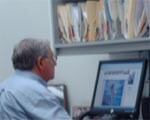People who keep doing some work in their field after they retire may enjoy better physical and mental health than those who stop working completely.

It's a well established fact that staying active benefits one's overall physical and mental health. But little is known how working after retirement helps retirees. To examine the relationship between bridge employment and retirees' health outcomes, researchers analysed the data on 12,189 workers in a U.S. health study that begun in 1992. Participants, who were between the ages of 51 and 61 at the outset, were surveyed every two years over a six-year period. During the follow-up period, the researches kept a track of their health and level of activity.
It was found that people who went into some form of bridge employment either in a career field or in a different field reported lower rates of major diseases like high blood pressure, heart disease, diabetes and arthritis during the study period than their counterparts who went straight into full retirement. On top of their better physical health, "bridge" workers also tended to report fewer mental health problems, such as depression. The same mental health benefits were not seen, however, when retirees took part-time work in other fields - possibly because many of these people may have taken those jobs out of financial need rather than choice.
The findings were not explained by older age or worse initial health among people who opted for full retirement.
The above findings suggest that bridge work, particularly in one's accustomed field, may benefit physical and mental health. Such work may help older adults maintain the active lifestyles they had during their careers and decrease any stress they might feel from the transition into retirement. When it comes to mental health, for instance, bridge work may help by allowing people to keep some of the role identity that they have formed over their careers.
DoctorNDTV is the one stop site for all your health needs providing the most credible health information, health news and tips with expert advice on healthy living, diet plans, informative videos etc. You can get the most relevant and accurate info you need about health problems like diabetes, cancer, pregnancy, HIV and AIDS, weight loss and many other lifestyle diseases. We have a panel of over 350 experts who help us develop content by giving their valuable inputs and bringing to us the latest in the world of healthcare.












